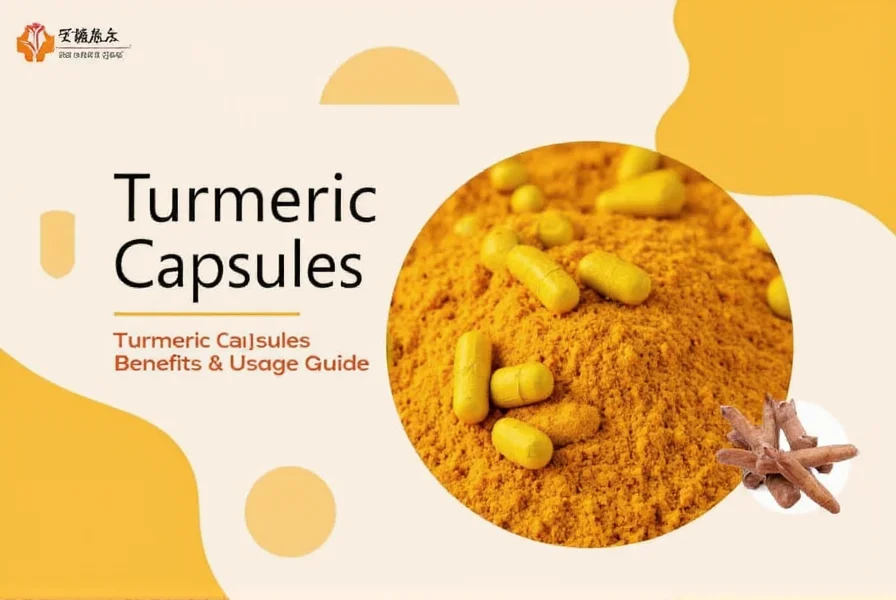Curcumin, the primary bioactive compound in turmeric, has gained significant attention in nutritional science for its potential health benefits. Turmeric capsules provide a concentrated form of this compound, addressing the natural limitation that culinary turmeric contains only about 3% curcumin by weight. Modern supplement formulations often include absorption enhancers like piperine to overcome curcumin's notoriously poor bioavailability.
The Science Behind Turmeric Supplements
Multiple clinical studies have investigated curcumin's biological effects. A comprehensive review published in Molecules (2022) analyzed 120 clinical trials involving curcumin supplementation. The research indicates that standardized curcumin extracts demonstrate measurable anti-inflammatory effects, particularly when formulated with absorption-enhancing compounds. The typical effective dose range in these studies was 800-2,000 mg of standardized curcumin extract daily, taken in divided doses.

Evidence-Based Benefits of Turmeric Capsules
Research suggests several potential applications for turmeric supplements:
- Inflammation management: Multiple studies show curcumin may help reduce inflammatory markers like C-reactive protein (CRP) and interleukin-6
- Joint health support: Clinical trials indicate potential benefits for osteoarthritis symptoms when using enhanced-absorption formulations
- Antioxidant properties: Curcumin demonstrates free radical scavenging capabilities in laboratory studies
- Mood support: Emerging research suggests possible benefits for emotional wellness through modulation of neurotransmitter activity
It's crucial to understand that individual responses vary significantly. The Arthritis Foundation notes that while some people experience noticeable benefits, others may not respond to turmeric supplementation at all.
Understanding Turmeric Supplement Formulations
Not all turmeric capsules deliver equal benefits. The market offers various formulations with different absorption rates:
| Formulation Type | Average Bioavailability | Typical Daily Dose | Cost Consideration |
|---|---|---|---|
| Standard turmeric extract (95% curcumin) | 1x (baseline) | 1,500-2,000 mg | $$ |
| Curcumin with piperine | 20x baseline | 750-1,000 mg | $$$ |
| Liposomal curcumin | 30-40x baseline | 500-750 mg | $$$$ |
| Curcumin phytosome (Meriva®) | 29x baseline | 500-1,000 mg | $$$ |
The table illustrates why understanding formulation differences matters when evaluating turmeric capsules for inflammation or other specific purposes. Enhanced formulations typically require lower doses to achieve similar blood levels of curcumin.
Recommended Usage Guidelines
For those considering turmeric supplementation, evidence-based usage recommendations include:
- Dosage: Most clinical studies use 500-1,500 mg of enhanced-absorption curcumin daily, divided into two doses
- Timing: Taking with food, particularly fatty meals, can improve absorption of standard formulations
- Duration: Research suggests benefits may take 4-8 weeks of consistent use to become noticeable
- Combination: Formulations containing piperine (black pepper extract) significantly enhance curcumin absorption
The European Food Safety Authority has established an acceptable daily intake of 0.13 mg per pound (0.3 mg/kg) of body weight for curcumin. This translates to approximately 22 mg for a 175-pound adult. However, most supplement doses exceed this amount, highlighting the importance of professional guidance.
Potential Side Effects and Interactions
While generally well-tolerated, turmeric capsules side effects can include:
- Mild digestive discomfort, especially at higher doses
- Increased risk of bleeding when combined with anticoagulant medications
- Potential interactions with diabetes medications
- Rare cases of allergic reactions
Individuals with gallbladder issues should exercise caution, as turmeric may stimulate bile production. Those scheduled for surgery should discontinue turmeric supplements at least two weeks beforehand due to potential bleeding risks.

Quality Assessment for Turmeric Supplements
When evaluating how to choose quality turmeric supplements, consider these evidence-based criteria:
- Standardized extract: Look for products specifying curcuminoid content (typically 95%)
- Third-party testing: Verification from organizations like USP, NSF, or ConsumerLab
- Transparency: Complete ingredient listing with no proprietary blends
- Formulation type: Enhanced absorption formulas typically deliver better results
- Expiration date: Curcumin degrades over time, so freshness matters
A 2023 analysis by the American Botanical Council found significant variability in actual curcumin content among commercial products, with some containing less than 50% of the labeled amount. This underscores the importance of selecting products with independent quality verification.
Realistic Expectations for Turmeric Supplementation
While research on curcumin is promising, it's essential to maintain realistic expectations about does turmeric really work for specific conditions. The National Center for Complementary and Integrative Health states that while preliminary research shows potential benefits, more large-scale human trials are needed to confirm many claimed effects.
Turmeric supplements should be viewed as complementary to, not replacements for, conventional medical treatments. They work best as part of a comprehensive approach to health that includes proper nutrition, regular exercise, and appropriate medical care.











 浙公网安备
33010002000092号
浙公网安备
33010002000092号 浙B2-20120091-4
浙B2-20120091-4